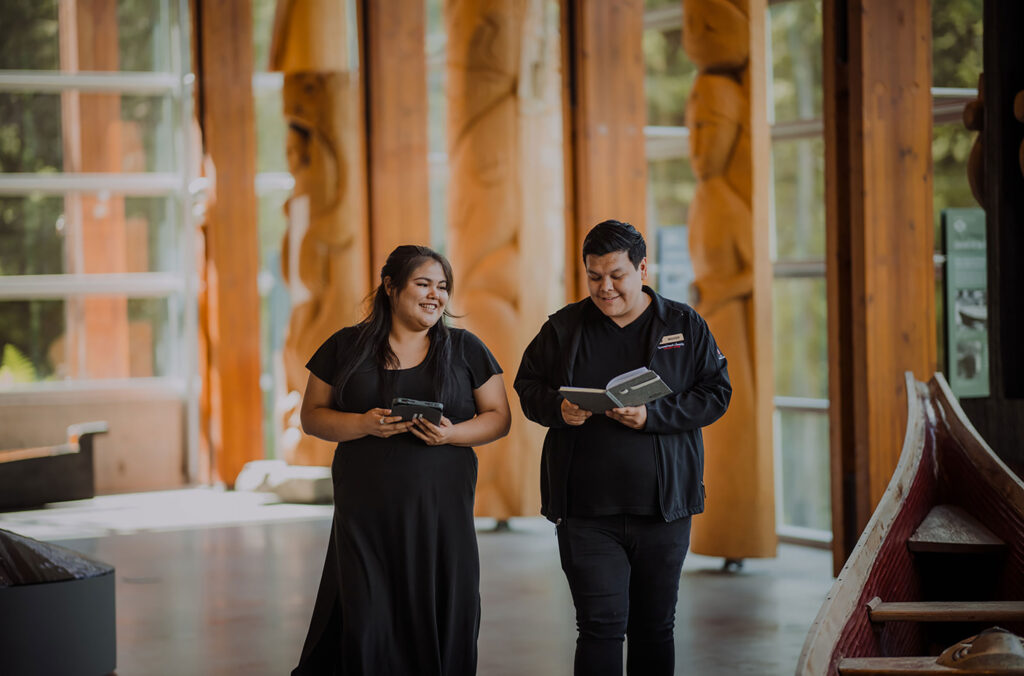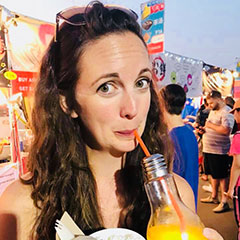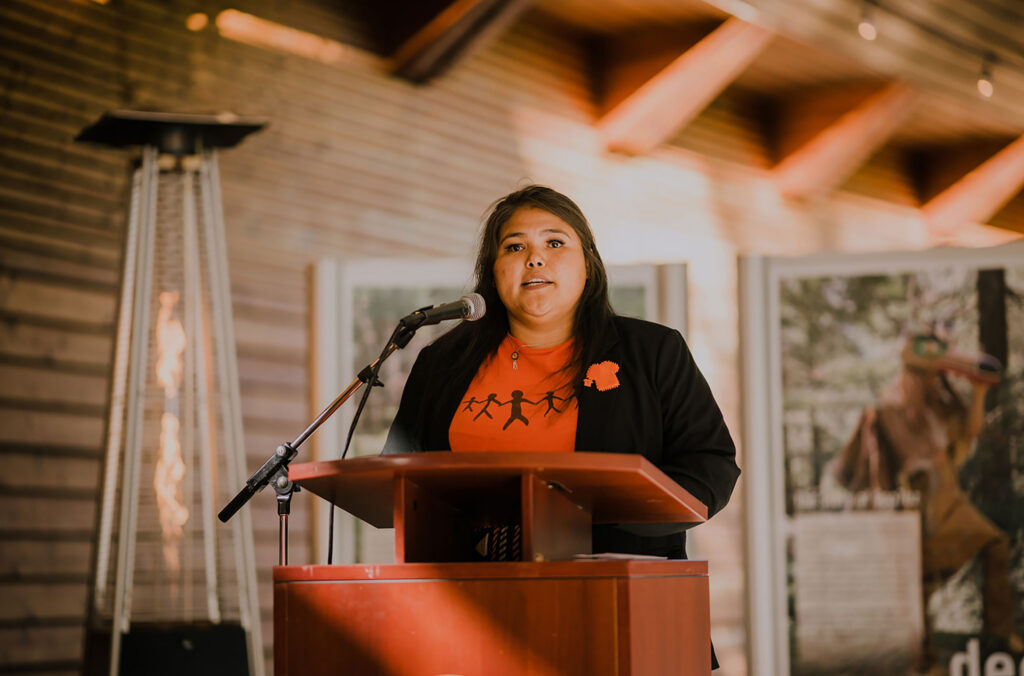It’s hard to believe that T’ec Georgina Dan (Líl̓wat7úl), Cultural Leader of the Spo7ez Performance team and a graduate and co-facilitator of the Indigenous Youth Ambassador Program at the Squamish Lil’wat Cultural Centre (SLCC), found it hard to find her voice.
At the time of publishing this, I was able to watch her recent TEDx Talk where she discusses her path towards reconciliation and how storytelling is a key part of the revitalization of her culture. Her poise and eloquence make you lean in and pay attention.
Georgina’s journey to finding her voice is intertwined with an understanding of her culture, where it intersects with the outside world and what she feels is her duty and honour to share. Ahead of National Truth and Reconciliation Day (September 30), we spoke with Georgina about her journey, finding her voice and the difference she wants to make with it.
Where did you grow up?
I am from the Lil’wat Nation. I’ve lived in the same house all my life in Mount Currie. I learned about my culture at school. I learned it the modern way. I didn’t have the language in my household. When my parents grew up they were forbidden to learn it; it was illegal to practice their culture.
I started working at the Pemberton Museum when I was 14. I catalogued, researched and handled donation requests. I was pretty shy back then. Pioneer history was the focus of the museum and I would take a few people on tours. It was the first time I had to think about what I wanted to share with other people. But what I remember the most is that there was this small section on the history of the Lil’wat; I looked at it all the time.

Did you follow this yearning to learn more about the Lil’wat Nation?
I went to the T’zil Learning Centre and when it came to the time to decide what I wanted to do post-secondary they held a job fair. The Squamish Lil’wat Cultural Centre had a booth and a relative of mine convinced me to apply to be a tour guide. I was hesitant, but I knew it would be a good fit. It’s where I could continue to learn.
How did you get into singing and dancing?
We were able to experience working in food and beverage and in retail at the SLCC, but what I loved learning about was our culture. It took me several months to do the lead singing, but it felt like it was something I’ve always done. Typically, the men would do the speaking and lead singing at events and women would organize everything.
The UNCEDED exhibit is about the Indigenous connection to the land here in the Sea to Sky, how do you feel about that connection?
We believe the people are the land and the land is the people.
A lot of our teachings come from the land. Our language comes from the land. The names of things often sound like the things they’re applied to, the way they’re sung, like the wind or way things grow, the berries, and animals.
I learned the love of my land from my parents. Seeing how passionate they were about continuing to do traditional care of the land made me want to learn what they’d learned. I was happy to represent my family in the exhibit.
I learned that a lot of our people were still hunting and gathering in that area up until the 80s. What’s meaningful to me is to let people know that my family has been here for a long time. I like to tell the story to people who only really know Whistler as a ski resort; that Nicklaus North is where some traditional gathering places were. Even though we didn’t occupy all the land all at once, we were still using all of it.
Both the Lil’wat and Squamish Nations are nomadic but within their own territories. We’d move with the resources and the seasons. To be able to hear that I have a connection to the land and share that in such a public space and for people to receive it in that way, it’s meaningful. I’m speechless with how this exhibit came to be and all the conversations it has started. There’s more space to have these conversations.
I can imagine these conversations aren’t easy?
Words like unceded; I know these can lead to some uncomfortable conversation with our history, but it’s supposed to be uncomfortable.
This exhibit makes it feel less uncomfortable. It takes all of the stories we’ve been carrying and represents them in more of a receptive way to today’s society. This feels weird to say because people should always be receptive to those stories, but recreating it through a lens that people know, in an art gallery, creates a different space.
What are you working on personally?
Storytelling and public speaking. During this time I feel a lot of people are looking for opinions and direction for reconciliation and decolonization. They don’t know what that looks like. Personally, I’m still learning what that looks like.
I’ve grown up in a colonized world and in a system. I’ve learned my traditions but I didn’t grow up in the strict traditional, Lil’wat style. I feel like I have to decolonize my mind and the way I’m working. I’m learning how to work with the culture, our history, and how to share the history that we were given, Canada’s history. How do I help people on their journey as well as being on my own?
I don’t believe we’ll find reconciliation within my lifetime, but I feel it would be great to be part of keeping the conversations going, to make that impact.
How do you look after yourself while sharing this information and having these deep conversations?
There are days when I just don’t want to indulge in any conversations about reconciliation or decolonization; because it does become heavy, realizing that there’s still a long way to go and that the paths people are on aren’t always because of them, but because of the system that we were brought up in.
As an ambassador, I am often one of the only Indigenous people visitors might have met. I get asked questions like; are Indigenous peoples extinct? Those questions get difficult. I think; do I want to be upset still? Often I take a breather and realize they’re at a place in their journey where they feel like they can ask that.
A lot of people come to ask how I can help them. I can help them come to an understanding, I won’t tell them what to do or do it for them, but help with how they can do it for themselves or alongside one another.
It’s like I’m in this baton race, with me being the baton holder. My place is pretty easy compared to where my grandparents and parents’ places were. My place is to make the culture well known again and to be able to share it and foster respect between both parties.
There’s still a lot of work to be done so that Indigenous people are seen as an equal. The SLCC is a place of connection, especially to our nation members, and then to resort partners like Vail Resorts, Resort Municipality of Whistler, Fairmont and Four Seasons, etc.
Where would you personally like to see change in Whistler?
Walking through town is still weird for me. You don’t see a lot of Indigenous people here. Whistler was created as an entertainment kind of town and when I walk through town in my regalia, there are instant thoughts that I’m walking through to provide some street entertainment. People ask to take photos with me in my “costume” and comment on how great I look. They don’t recognize my regalia is not a costume and represents who I am, where I’m from, and what work has been done to earn it.
One day, I want to feel, that if I have my regalia on, people will acknowledge me for representing my family, rather than wearing a costume for entertainment.
I am in the process of decolonizing my own mind. It’s okay to take up space and represent our people. We don’t have to fight for that room anymore. We’re in our own place and it’s okay to share our voice and our stories.
What are the steps locals and visitors could take to help get us to that future?
Keep the questions coming, but have the understanding that there’s been a lot put on Indigenous people for a number of years, and there might not be an answer right now. We might still be going through the process of finding that answer.
I always say it could simply be with a pot of tea with somebody. I’ve learned the most over tea and some baking. Our language wasn’t written until the late 1970s so a lot of our people have learned through stories. As humans, we don’t have empathy until we hear a real story, a real experience or experience something for ourselves. So hearing personal stories from the people themselves, and being able to recognize them in the proper way, can go a long way.
I still have a lot to learn about the world. I’m still in awe when I go into Whistler. When I grew up I didn’t see myself working like this. I spend quite a lot of time in Whistler now, for my own needs, time away from Pemberton and Mount Currie. The Whistler community is quite small so you get to know everybody. I’ve been trying to get to more Whistler community events.
I’ve seen leaders come and join some of our open invitational, community events and it really does count and matter. It sounds simple, but it’s quite a task to create those connections. I see a lot of the neighbouring community members and leadership who have an interest in making genuine connections. It doesn’t feel like they’re here to make executive decisions or have meetings; they are part of the group and they’re getting an understanding of what is needed and what people are enjoying.
How did you find your voice?
There are a lot of people who are not in a place to speak about reconciliation, but I’d like to be that voice. I grew up in a time when there wasn’t a voice, and it’s finally coming out now and we’re visible on our own lands now.
Being able to speak about what to do and how to make those connections, I feel, is very important. I’ve made so many connections with the Whistler community, which has been bringing some Indigenous representation into the community. I want to be able to recognize our nations in the proper way, give a little guidance and get a little guidance myself when I don’t know.
What’s your dream?
I’ve always dreamed of doing a TEDx Talk. I hope to be able to speak about how it can be challenging, yet simple to be on this journey. And how you have to have patience and be able to take care of yourself at the same time.
A lot of the time, when we think of fixing things or being able to help things, there’s this end goal. But I don’t think there’s an end goal with reconciliation until all the statistics are the same.
Right now, 54% of Indigenous peoples are living under the poverty line. Until those stats are all even for Indigenous people, I don’t see an end goal for reconciliation and that’s why I say I don’t see it happening within my lifetime.
There has to be more Indigenous involvement and more Indigenous-led programming for Indigenous needs. There are a lot of voices for Indigenous people, who aren’t Indigenous. This is great because it’s not all meant to be from Indigenous people, reconciliation work is supposed to be for everybody, but there needs to be Indigenous voices.
It wasn’t too long after this interview that Georgina presented her TEDx Talk in Whistler. You can view the powerful video below.
A visit to the SLCC is a must-do to understand the land you’ve come here to enjoy and it’s open year-round. National Truth and Reconciliation Day, on September 30, is a time we can all use to engage in listening, learning and reflection. Admission to the SLCC on this day is free and there’s programming happening throughout the day. You see what’s happening on September 30, visit the SLCC website.


